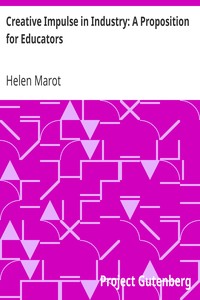Creative Impulse in Industry: A Proposition for Educators by Helen Marot
"Creative Impulse in Industry: A Proposition for Educators" by Helen Marot is a thorough treatise on the intersection of education and industrial practice, written during the early 20th century. The book examines the critical role of creativity and individual growth within the framework of industrial education, contrasting American and German approaches to vocational training. Marot suggests that both education and industry must collaborate to foster not just efficient workers but also individuals
who can enjoy and engage in the creative process of work. The opening of this work introduces the Bureau of Educational Experiments, highlighting the need for rethinking educational practices to better adapt to modern industrial needs. Marot discusses the psychological and social implications of moving towards a more creative industrial education, critiquing the prevailing norms that prioritize mechanization and efficiency over personal growth and meaningful engagement with work. She points out how both the American reluctance to unify education with industrial enterprise and the deterministic nature of the German system inhibit true growth and innovation, thus setting the stage for a discussion on alternative methods that could nurture a more holistic approach to vocational training. (This is an automatically generated summary.)
Read or download for free
| How to read | Url | Size | |||
|---|---|---|---|---|---|
| Read now! | https://www.gutenberg.org/ebooks/12594.html.images | 221 kB | |||
| EPUB3 (E-readers incl. Send-to-Kindle) | https://www.gutenberg.org/ebooks/12594.epub3.images | 163 kB | |||
| EPUB (older E-readers) | https://www.gutenberg.org/ebooks/12594.epub.images | 165 kB | |||
| EPUB (no images, older E-readers) | https://www.gutenberg.org/ebooks/12594.epub.noimages | 134 kB | |||
| Kindle | https://www.gutenberg.org/ebooks/12594.kf8.images | 374 kB | |||
| older Kindles | https://www.gutenberg.org/ebooks/12594.kindle.images | 359 kB | |||
| Plain Text UTF-8 | https://www.gutenberg.org/ebooks/12594.txt.utf-8 | 207 kB | |||
| Download HTML (zip) | https://www.gutenberg.org/cache/epub/12594/pg12594-h.zip | 163 kB | |||
| There may be more files related to this item. | |||||
Similar Books
About this eBook
| Author | Marot, Helen, 1865-1940 |
|---|---|
| Title | Creative Impulse in Industry: A Proposition for Educators |
| Contents | Production and creative effort -- Adapting people to industry. The American way -- Adapting people to industry. The German way -- Educational industry and associated enterprise. |
| Credits | Produced by Produced from images provided by the Million Book Project and the Online Distributed Proofreading Team |
| Reading Level | Reading ease score: 41.3 (College-level). Difficult to read. |
| Language | English |
| LoC Class | LC: Education: Special aspects of education |
| LoC Class | T: Technology |
| Subject | Technical education -- United States |
| Subject | Working class -- Education -- United States |
| Subject | Business and education -- United States |
| Category | Text |
| EBook-No. | 12594 |
| Release Date | Jun 1, 2004 |
| Most Recently Updated | Oct 28, 2024 |
| Copyright Status | Public domain in the USA. |
| Downloads | 308 downloads in the last 30 days. |
| Project Gutenberg eBooks are always free! | |

